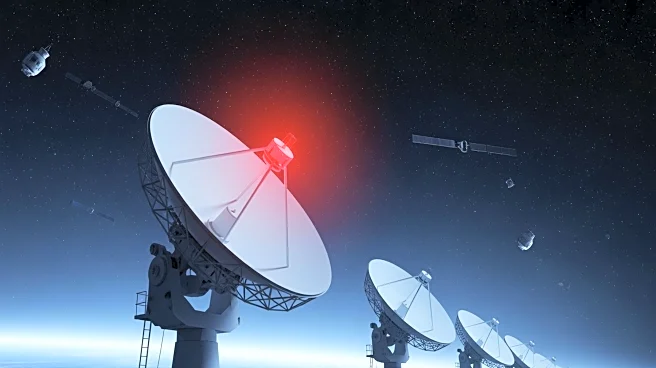What's Happening?
Germany and the United Kingdom have raised alarms over the increasing threat posed by Russian and Chinese satellites, which have been observed spying on Western satellites. German Defense Minister Boris
Pistorius highlighted the threat during a space industry conference in Berlin, noting that Russian satellites have been tracking IntelSat satellites used by the German Armed Forces. The UK Space Command has also reported Russian satellites stalking and jamming British assets weekly. These actions are part of Russia's expanded space warfare capabilities, which include jamming, blinding, and potentially destroying satellites. The warnings come amid Russia's ongoing invasion of Ukraine, with increased cooperation between Moscow and Beijing in satellite reconnaissance. NATO Secretary General Mark Rutte has warned of Russia's plans to develop nuclear weapons in space, although Russian President Vladimir Putin has denied such intentions.
Why It's Important?
The threat posed by Russian satellites has significant implications for military operations and civil aviation, as they can disrupt communications, navigation, and positioning systems. This interference could impact satellite imagery, telecoms, and broadband internet access, crucial for both civilian and military applications. The situation underscores the need for increased investment in space defense capabilities by Western nations. Germany plans to allocate up to €35 billion for space projects over the next five years, while the UK is enhancing its defense spending and testing sensors to detect laser threats in space. The strategic importance of space as an operational domain for NATO highlights the necessity for transatlantic cooperation to counter these threats.
What's Next?
Germany and the UK are expected to continue increasing their investments in space defense capabilities. Germany's procurement measures for space are projected to grow significantly, while the UK is conducting a strategic review of its capabilities. France is advocating for 'bodyguard satellites' to protect other satellites, and NATO has declared space an operational domain, applying Article 5 to space threats. The US, with its historic advantage in space, may play a crucial role in supporting European allies through NATO cooperation. Analysts emphasize the urgency for NATO to enhance its space enterprise to avoid falling behind, particularly in comparison to China's advances.
Beyond the Headlines
The broader implications of Russian satellite activities include potential shifts in global power dynamics in space. The development of space-based nuclear weapons by Russia, if realized, could lead to a new arms race in space, raising ethical and security concerns. The integration of satellite systems into military infrastructure is crucial, as evidenced by Russia's reliance on commercial satellite imagery, indicating gaps in its capabilities. The situation highlights the importance of international cooperation and regulation to prevent the militarization of space and ensure the security of global satellite networks.









